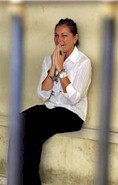Other Aspects
There are also a raft of other strange or dubious events.
William Miller
One example is the Sydney man, William Miller, who claimed that a drug-dealing associate offered him $50,000 to collect a package from Sydney airport on the same day Schapelle Corby traveled [3]. But the plan apparently went awry when a baggage handler who was meant to remove the drugs at Sydney airport refused to touch the package because he feared police were watching.
Mr Miller wanted immunity from prosecution, but was also subjected to a media campaign to discredit him [4]. The AFP have shown no apparent direct interest in a person openly confessing to involvement in a major drug operation (with NSW Police apparently conducting only an informal cursory interview). You might well wonder how long you would remain on the streets if you made a similar claim tomorrow.
John Patrick Ford
There is the case of John Patrick Ford, who whilst on remand in Victoria, testified to the court that the marijuana had been loaded into Schapelle Corby’s luggage without her knowledge by baggage handlers in Brisbane, and should have been removed in Sydney. He stated that it was a bungled domestic transit operation on behalf of an alleged drug czar, Ronnie Verganza [27]. Shortly after his public stance, he was stabbed with a razor blade in jail [29].
A Precedent
There are also reported precedents. For example, there is the case of ‘Steve and Dee’ who on arrival in their Bali hotel found compressed marijuana in their bag [28] [29]. They contacted the Australian Consulate who advised them to flush the drugs down the toilet. Despite raising this incident during the Schapelle Corby case and despite it being confirmed by the Department of Foreign Affairs, neither the AFP nor any other police force contacted or interviewed them.
The Mocha Informant
It is an intriguing fact that the Operation Mocha informant, known as TOM, was registered on Dec 14 2004 [33]. As the Indonesians could hold Schapelle Corby for 60 days without charge, the expiry date was Dec 7th 2004. This suggests that perhaps TOM had been wrestling the morals of whether to report the syndicate. He is reputed to have done so, potentially risking his own life, because he had a "gutful" of a certain person: perhaps Schapelle Corby and her highly visible suffering at the time.
Open Access To Baggage
An aspect obvious from the outset of this case was that access to the baggage handling areas was almost wide open. Indeed, Ray Cooper, former AFP Internal Investigator, has stated that “And I can tell you that I've, we've done some operations on the Gold Coast, checking baggage, internal baggage if you like on domestic flights, and there was no control at the back of that airport, everyone, every man and his dog could access those baggages.”
Regarding the use of innocent passengers as ‘drug mules’ Mr Cooper confirmed that “Yes, it was well known, it was a well-known amongst the federal police that this particular operation and this particular strategy was being adopted by criminals.” [28]. He also confirmed that his concerns about corruption in baggage handling in Australian airports was never adequately investigated.
Quite apart from this, there are many other incidents regarding the behavior of baggage handlers themselves which cause significant concern. For example, the case shortly after Schapelle’s arrest when a baggage handler rifled through a passenger’s bags, removed a camel suit and then drove around the airport tarmac wearing it. This was witnessed by the camel suit owner who was flabbergasted [29].
Next: Conclusion and References
Return to Main Propositions Page
Labels: baggage handlers, john patrick ford, operation mocha, william miller


